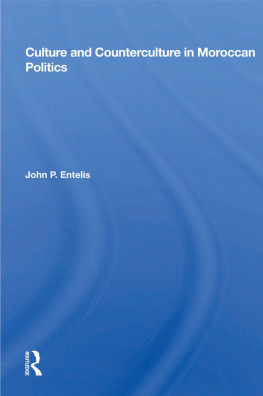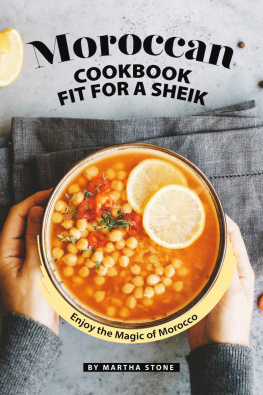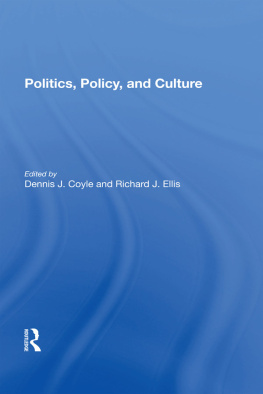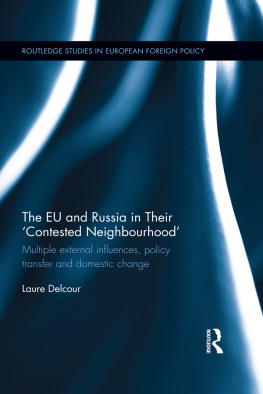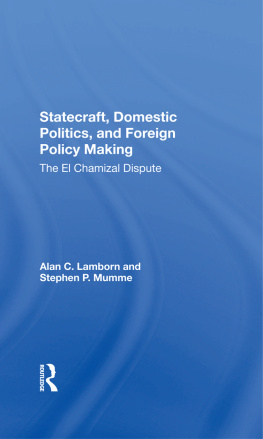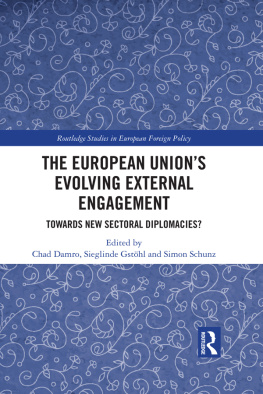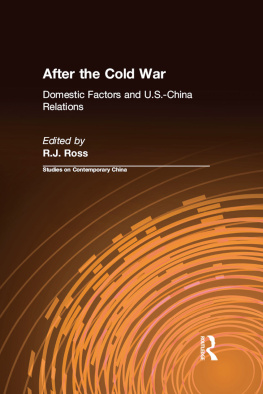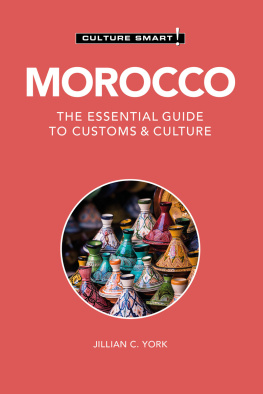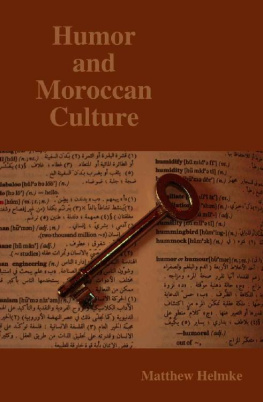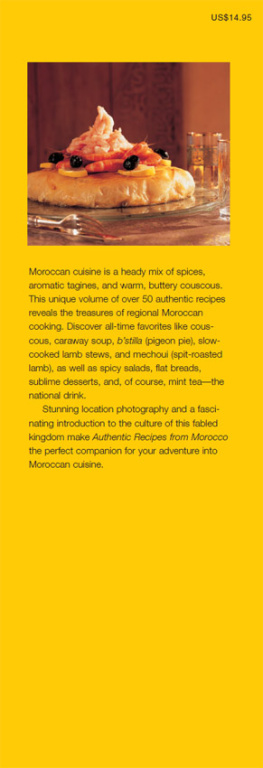First published 1989 by Westview Press
Published 2018 by Routledge
52 Vanderbilt Avenue, New York, NY 10017
2 Park Square, Milton Park, Abingdon, Oxon OX14 4RN
Routledge is an imprint of the Taylor & Francis Group, an informa business
Copyright 1989 by Taylor & Francis
All rights reserved. No part of this book may be reprinted or reproduced or utilised in any form or by any electronic, mechanical, or other means, now known or hereafter invented, including photocopying and recording, or in any information storage or retrieval system, without permission in writing from the publishers.
Notice:
Product or corporate names may be trademarks or registered trademarks, and are used only for identification and explanation without intent to infringe.
Library of Congress Cataloging-in-Publication Data
Entelis, John P. (John Pierre), 1941
Culture and counterculture in Moroccan politics / by John P.
Entelis.
p. cm. (Westview special studies on the Middle East)
Bibliography: p.
Includes index.
ISBN 0-8133-7650-5
1. MoroccoCivilization. 2. MoroccoPolitics and government.
3. Politics and cultureMorocco. 4. MoroccoKings and rulers.
I. Title. II. Series.
DT312.E57 1989
964dc19
88-19054
CIP
ISBN 13: 978-0-367-01281-6 (hbk)
Chapter One
Introduction
[The country] appears to be a happy phenomenon, unique in the third world, a prosperous liberal country. It has a parliamentary body, freely elected in the competition of a plurality of independent political parties. Its politicians are, as politicians go, relatively reasonable men. The tone of public debate is not strident. The Chamber of Deputies is an orderly assembly. Elections are conducted with a minimum of violence, and reports of coercion of the electorate are rare. [The country] enjoys freedom of association and freedom of expression. Its press is literate and not too sensational or abusive. Its citizens, freely organized, feel free to approach their parliamentary representatives either as individuals or through their organizations. It is a law-abiding country in many important respects and passions are held in check; public order is maintained without a large display of force. People do not disappear in the night, their families ignorant of where they have been taken by the police. Strikes, violent demonstrations, angry class antagonisms are relatively infrequent for a country of growing economic differentiation. Finally, the country is prosperous (Shils 1966, 1).
The good news is that the above description is a relatively accurate portrayal of contemporary Morocco. The bad news is that this is actually a Western social science assessment of pre-1975, pre-civil war Lebanon. This is not to say that Morocco is doomed to replicate Lebanon's tragedy and disintegration. It is rather to suggest that very different and competing interpretations exist as to the authenticity, profundity, and durability of Morocco's apparent success at blending political pluralism and economic development with traditional values and patrimonial cultural norms. As with Lebanon during its heyday of "ethnoconfessional democracy," Morocco arouses passionate debate as to the appropriate pathway for achieving modernization and development. This book will not resolve that debate. It will, instead, provide a frameworkone based on the role and relevance of "culture" as an explanatory variablewith which to understand the terms and implications of that debate. In the book, alternative scenarios will be sketched and forecasts will be offered.
Culture and politics in Morocco relate in an interactive blend of conflict and congruence producing a distinctive style of adaptive modernization in the socioeconomic sphere and incremental democratization in the political arena. With continuity and change representing Morocco's pattern of development in the more than thirty years since independence in 1956, no single cultural form adequately defines or determines the country's national identity. Instead, several cultural orientations coexist, sometimes in harmony, other times in conflict. Specifically, four distinguishable cultural patterns can be identified: monarchical, modernist, militarist, and messianic. Although these orientations both compete with and complement each other, they all share a strong and abiding affinity to an overriding cultural "core" around which revolve the three identity-forming beliefs, Islam, Arabism, and Moroccanism, creating a so-called Muslim consensus. It is this tripartite cultural core or Muslim consensus that explains much of the country's success at reconciling subcultural differences and discontinuities. Monarchical power and manipulation by themselves could not create a system of rule that is relatively pluralistic, open, and equitable by most Afro-Arab standards.
Monarchism
Monarchical culture revolves around the institution of the monarchy, which fuses both religious authority and political legitimacy. Simultaneously, the monarchy draws its legitimacy from the past by invoking Islam, Arabism, and three centuries of Alawite rule while deriving authority in the present by calling for rationalism, modern leadership, and technocracy (Geertz 1973, 248). The king's legitimacy thus derives from "intrinsic" authority"an organic property magically ingredient in the ruler's person"and "contractual" authority which is "conferred upon him, in some occult and complicated way, by the population he rules" (Geertz 1968, 76). "Normally" and in other places, these two traditions would be considered radically and irreconcilably opposed. But in Morocco, "where the talent for forcing things together which really do not go together is rather highly developed, they are fused if not exactly into a seamless whole at least into an integral institution which has, so far, proved quite effective in containing, even in capitalizing on, its own inner contradictions" (Geertz 1968, 76).
The full meaning of the monarchy's multiple roles in culture, society, and politics will be discussed later. It is sufficient to note here that the monarchy is the only national institution that embodies all three pillars of the Muslim consensus as part of its ongoing, active legitimization. The other cultural orientations and structures can effectively claim only portions of the cultural core. Indeed, these same structurespolitical parties, intellectuals, fundamentalists, the armymust attach themselves to the cultural triumvirate even as they attack, directly or indirectly, the monarchy itself or the king as an egregious violator of Morocco's national interests.
The distinctive features of the monarchical orientation are its commitment to cultural synthesis, adaptive modernization, and incremental democratization. The same contradictory traditions that have been effectively fused in creating that "peculiar" institution of the monarchy have also applied to a range of cultural dyadssecular and religious, scripturalist and saintly, Arab and Berber, urban and rural, European and African, national and parochialwhich have either been synthesized or functionally harmonized. The resulting blend is a culture that is diverse at its base but uniform nationally. The fact that the relatively brief period of European colonial rule did not fundamentally disrupt the Muslim consensus but instead catalyzed and reinvigorated it in respect to the monarchy assisted the process of fusion in the postindependence period. Unlike the situation in neighboring Algeria, where the cultural "glass" was profoundly shattered as a consequence of 132 years of colonial domination, Morocco did not have to reassemble a multitude of broken pieces.


